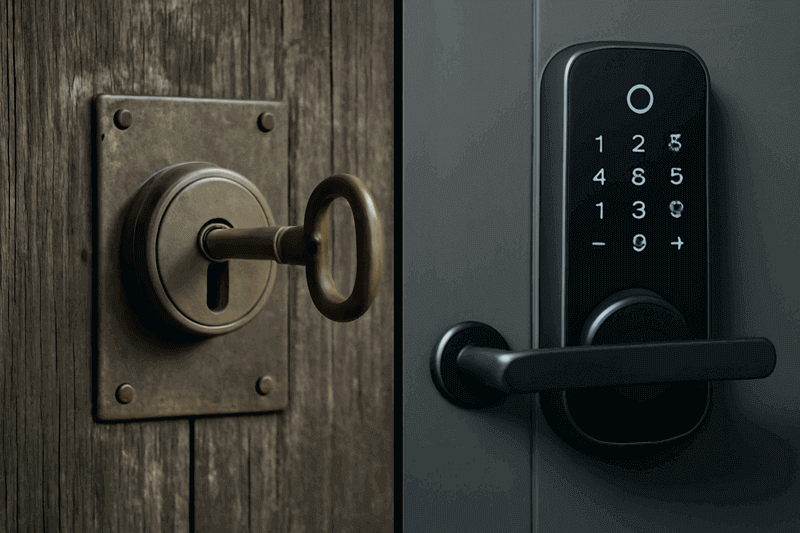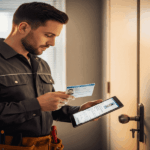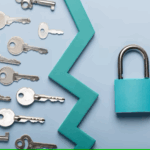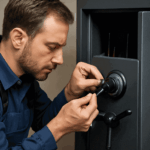Home security has evolved dramatically over the past decade, with smart locks emerging as a popular alternative to traditional key-based systems. Are smart locks safer than key locks? This question has become increasingly important as homeowners and businesses seek the most effective protection for their properties. Understanding the security implications of both options can help you make an informed decision that best suits your specific needs and circumstances.
Smart Locks vs Key Locks: Security Comparison
| Security Aspect | Smart Locks | Traditional Key Locks |
| Physical Vulnerability | Moderate (still pickable, but often more complex) | High (susceptible to picking, bumping) |
| Digital Security | Variable (depends on encryption, updates) | N/A |
| Access Control | Excellent (temporary codes, remote access, logs) | Limited (physical key required) |
| Power Dependency | High (requires batteries/power) | None |
| Entry Methods | Multiple (codes, apps, biometrics, backup keys) | Single (physical key only) |
| Monitoring Capability | Excellent (access logs, notifications) | None |
| Installation Complexity | Moderate to High | Low |
| Cost | Higher ($100-$500+) | Lower ($20-$100) |
| Maintenance | Regular (battery, software updates) | Minimal |

How Smart Lock Technology Works
Smart locks utilize advanced electronic mechanisms to provide keyless entry through various authentication methods. The most common types include:
Keypad smart locks require numeric codes for entry, while Bluetooth-enabled models connect to your smartphone for proximity-based unlocking. Wi-Fi smart locks offer remote access capabilities, allowing you to control your lock from anywhere with internet connectivity. Biometric smart locks use fingerprint recognition for the highest level of personalized security.
These devices typically employ AES encryption protocols and secure communication channels to protect against digital intrusion attempts, making them significantly more sophisticated than traditional mechanical systems.
Understanding Traditional Key Lock Mechanisms
Conventional key locks rely on pin tumbler systems that have been refined over centuries. When the correct key is inserted, it aligns the pins at the shear line, allowing the cylinder to rotate and the lock to open.
Standard deadbolts feature hardened steel construction and Grade 1 or Grade 2 ratings from the American National Standards Institute (ANSI). High-security traditional locks incorporate features like pick-resistant pins, drill-resistant plates, and reinforced strike plates to enhance physical security.
Are Smart Locks Safer? Key Security Advantages
Enhanced Access Control Capabilities
Smart locks excel in access management scenarios where traditional locks fall short:
- Temporary access codes can be created for guests, service providers, or rental properties without a physical key exchange
- Remote locking and unlocking allow you to secure your property from anywhere
- Multiple authentication methods provide backup options if one system fails
Superior Activity Monitoring
Modern smart locks offer unprecedented visibility into property access:
- Detailed access logs record every entry attempt with timestamps
- Real-time notifications alert you immediately when someone enters
- Security system integration creates comprehensive monitoring networks
Elimination of Physical Key Vulnerabilities
Smart locks address several traditional security weaknesses:
- No key duplication concerns since access is digital rather than physical
- Lost key security risks are eliminated through remote code changes
- Enhanced picking resistance due to electronic rather than purely mechanical operation
Smart Lock Security Disadvantages
Digital Attack Vectors and Cybersecurity Risks
The connected nature of smart locks introduces new vulnerabilities:
- Hacking attempts can target weak encryption or outdated firmware
- Network vulnerabilities may expose locks to remote digital attacks
- Software exploits can potentially bypass security protocols
Power and Technical Dependencies
Smart locks require consistent power and connectivity:
- Battery failure can lock you out unexpectedly without backup power
- Wi-Fi connectivity issues may prevent remote access functionality
- Software malfunctions can cause unexpected behavior or security gaps
Traditional Key Lock Security Benefits
Mechanical Reliability and Simplicity
Conventional locks offer time-tested advantages:
- No electronic failure points mean consistent operation regardless of power or connectivity
- Mechanical security has been refined through decades of real-world testing
- Independence from technology eliminates digital vulnerabilities entirely
Cost-Effective Security Solutions
Traditional locks provide excellent value:
- Lower initial investment makes quality security accessible
- Minimal maintenance costs with no batteries or software updates required
- Long-term durability often exceeds the smart lock’s lifespan
When Are Smart Locks Safer Than Key Locks?
Smart locks typically provide superior security in specific scenarios:
High-traffic environments benefit from access monitoring and temporary code capabilities. Rental properties and vacation homes gain significant security advantages through remote management features. Tech-integrated households with comprehensive smart security systems see enhanced protection through device coordination.
Businesses requiring audit trails find smart locks invaluable for compliance and security monitoring purposes.
When Traditional Locks Offer Better Security
Conventional locks may be preferable in certain situations:
Areas with unreliable power or internet connectivity should consider mechanical locks to avoid lockout scenarios. Budget-conscious installations can achieve excellent security with high-grade traditional deadbolts. High-security applications sometimes benefit from the simplicity and proven track record of mechanical systems.
Expert Security Recommendations
Security professionals often recommend hybrid approaches that combine both technologies. Installing a smart lock with a traditional deadbolt backup provides redundancy and addresses the weaknesses of each system.
Proper installation and maintenance significantly impact the security effectiveness of both lock types. Professional installation ensures optimal security positioning and reduces vulnerability to bypass techniques.
Conclusion: Making the Right Security Choice
Are smart locks safer than key locks? The answer depends on your specific security needs, technical comfort level, and threat environment. Smart locks offer superior access control, monitoring capabilities, and convenience features that can enhance overall security when properly implemented. However, traditional key locks provide reliable mechanical security without digital vulnerabilities or power dependencies.
The safest approach often involves assessing your unique circumstances, considering hybrid solutions, and prioritizing professional installation regardless of your choice. Both smart locks and traditional key locks can provide excellent security when selected and implemented appropriately for your specific situation.





